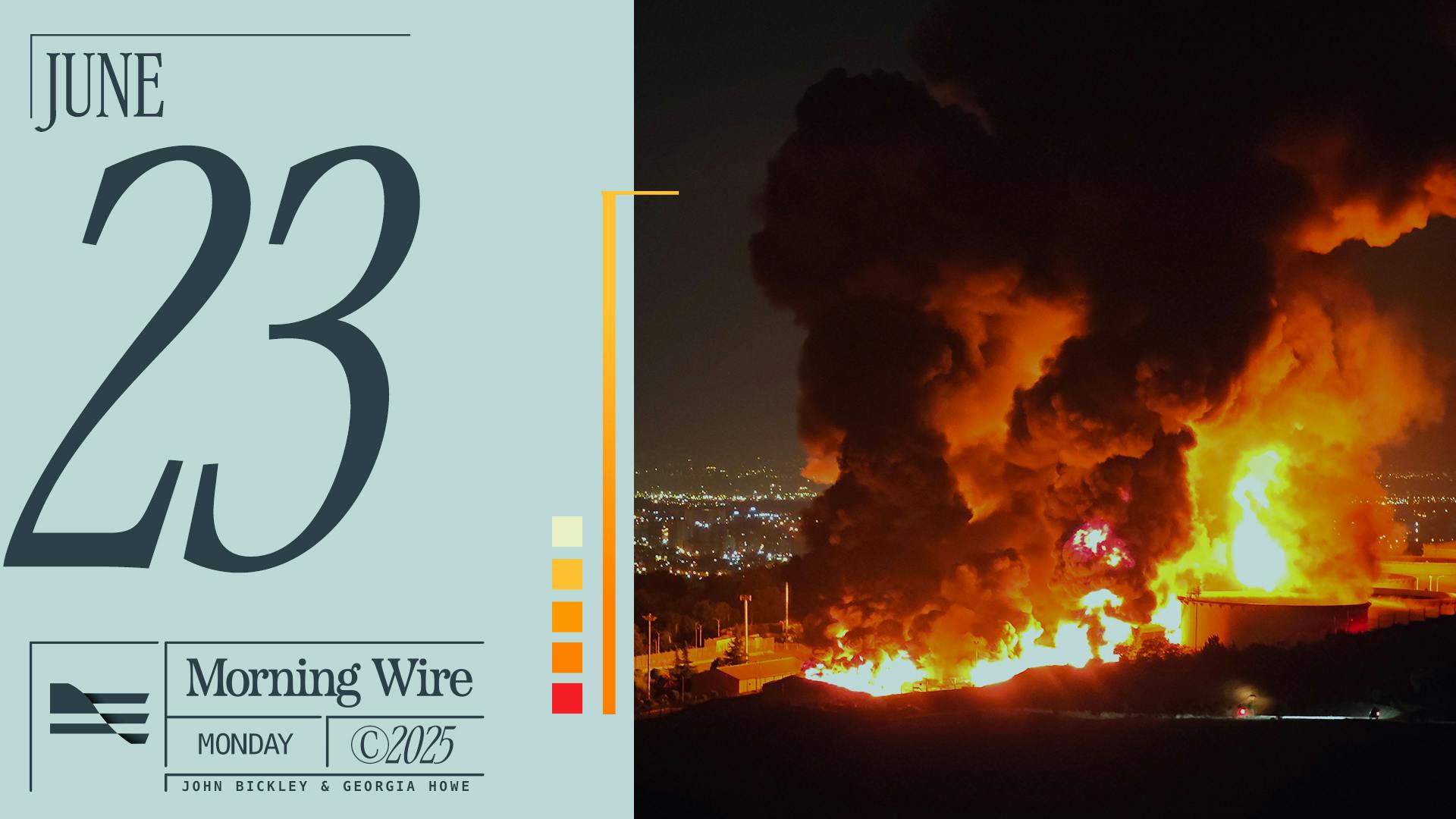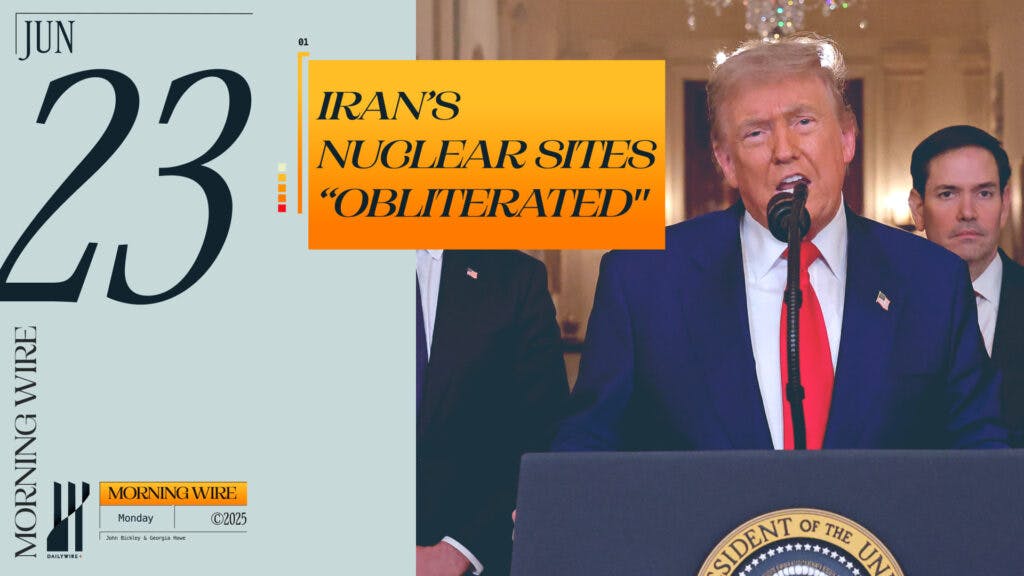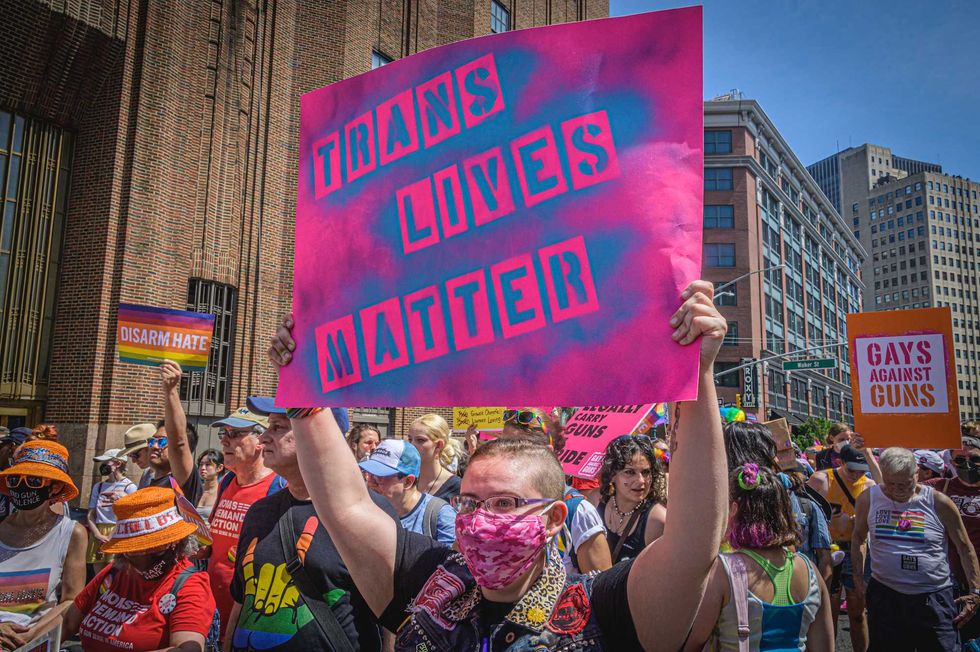Morning Brief: Iran’s Nuclear Sites ‘Obliterated’ As U.S. Prepares For Retaliation

The United States hits Iran’s nuclear facilities, and the world stands on edge for the regime’s response.
It’s Monday, June 23, and this is the news you need to know to start your day.
Morning Wire is available on video! You can watch today’s episode here:
If you’d rather listen to your news, today’s edition of the Morning Wire podcast can be heard below:
‘There Will Be Peace Or Tragedy For Iran’

Topline: In a historic move Saturday, the United States joined Israel’s war against Iran, bombing key nuclear facilities.
At midnight on Friday, a group of B-2 stealth bombers took off from Whiteman Air Force Base in Missouri. A number of those planes were noticed flying over the Pacific towards Guam – but it turns out, they were a decoy for the main group of seven B-2s, which flew undetected for 18 hours on a non-stop trip to Iran, refueling along the way. Once they entered Iranian airspace, they were joined by American fighter jets to defend against any surface-to-air missiles or Iranian aircraft.
Within minutes, the bombers dropped 14 bunker buster bombs on the Fordo and Natanz facilities — the Crown Jewels of the Iranian nuclear program, which were buried deep underground. Moments later, a third nuclear site was bombarded with Tomahawk missiles from an American submarine in the Middle East. The Pentagon said the strikes inflicted “extremely severe” damage, and that Iran’s enrichment program was “obliterated” — but we’re still waiting for intel on how much nuclear material was moved out of these facilities ahead of time.
“I can report to the world that the strikes were a spectacular military success,” President Donald Trump said in an address to the nation Saturday night. The president went on to make clear to the Ayatollah that he was prepared to launch further strikes if Iran retaliated against the United States or did not agree to a peace deal. “There will be either peace or there will be tragedy for Iran far greater than we have witnessed over the last eight days. Remember there are many targets left.”
Defense Secretary Pete Hegseth emphasized on Sunday that the Trump administration was not only looking for a drawn-out war. “This mission was not and has not been about regime change. The president authorized a precision operation to neutralize the threats to our national interests posed by the Iranian nuclear program, and the collective self-defense of our troops and our ally, Israel.”
According to a report by Axios, the president told Israeli Prime Minister Benjamin Netanyahu that he “does not want to continue attacks on Iran. He is ready to do so if the Iranians react against American forces, but… he wants peace.”
In response, the Iranian regime issued a threat to America, saying the strikes will “have everlasting consequences” and that Tehran “reserves all options” to retaliate.
What exactly that retaliation looks like is anyone’s guess, but a few likely options seem to be emerging.
- Fearing further strikes from the United States, Iran could stand down and agree to further peace talks.
- The Ayatollah responds like he did when Trump took out General Soleimani in 2020. In that instance, Iran launched a few missiles at American bases in the Middle East, but ultimately did not inflict any fatalities. Most experts viewed that response as a face-saving measure — Iranian officials called it a “slap” at the United States.
- Iran could launch an all-out barrage on American military bases throughout Iraq, Syria, and Kuwait.
Beyond military retaliation, Iran could also clamp down on oil exports. Hours after the strikes, Iran’s parliament voted to close the Strait of Hormuz, a strategic chokepoint connecting the Persian Gulf to the rest of the world, where a quarter of the world’s oil passes through. It’s unclear if Iranians could successfully enforce such a closure, but it would have an enormous impact on global oil prices, including those here in the United States.
“The people who are the most unhappy about this right now are the Chinese,” Jonathan Schanzer, senior vice president for research at the Foundation for the Defense of Democracies (FDD), told The Daily Wire. “They are the ones that are counting on Iranian shipments of oil…but of course this is a commodity. It’s a global commodity, which means you’re going to start to see shocks…. [The Iranians] want to try to make Americans feel pain at the pump. And absolutely, that’s what we’re likely to see for at least the short term. But you’ve got to remember that this is also the financial lifeline for the regime. So the more they shut off the Strait, the more they’re depriving themselves and their allies. That is not going to play well. This is a little bit like cutting off your nose to spite your face.”
U.S. Standing By For Iranian Counterattack

Topline: The United States’ direct attacks on Iranian nuclear facilities have heightened concerns about Iran targeting Americans abroad and at home.
Iran is likely to respond militarily to the American attack. Still, analysts are unsure what tools they have at their disposal – previous bombing runs by the Israel Defense Forces and missile exchanges with Israel have depleted or destroyed a significant portion of their long-range ballistic missiles. However, significant numbers of shorter-range missiles likely remain in play. These munitions would not have been useful in the prior Iran-Israeli conflict, but could hit U.S. military bases closer to Iranian territory.
“We’re waiting to see how many more ballistic missiles the Islamic Republic has in the tank, but thus far they’re still fighting,” Behnam Ben Taleblu, Senior Iran Program Director and Senior Fellow at the FDD, told The Daily Wire. “Base hardening is a thing you’ve seen the U.S. learn to do, particularly as Iran’s long-range strike capabilities evolve, get more precise, get to be more battlefield relevant. But most importantly, there is the introduction of missile and air defense assets into the region, making sure that anywhere, not just in the Middle East, but anywhere U.S. persons are deployed, that they are protected with whatever tier air and missile defense that is required. I would say also, prior to this crisis even being triggered, you saw the downsizing of some of the U.S. diplomatic facilities in the region. Basically, this is a logistical move designed to make sure that these facilities are less of a truck target that can be used by the regime to spill blood.”
Alternatively, some are expressing concern that Iran could respond to America’s strikes by activating terror cells around the world — it’s also possible the strikes could motivate radicals unaffiliated with the regime. With that in mind, authorities in cities around the United States say they are on high alert.
The NYPD, for example, said it is deploying additional resources to “religious, cultural, and diplomatic sites across NYC” — we saw similar statements from police departments in Washington, D.C., Los Angeles, and elsewhere.
Originally Published at Daily Wire, Daily Signal, or The Blaze
What's Your Reaction?
 Like
0
Like
0
 Dislike
0
Dislike
0
 Love
0
Love
0
 Funny
0
Funny
0
 Angry
0
Angry
0
 Sad
0
Sad
0
 Wow
0
Wow
0











































































